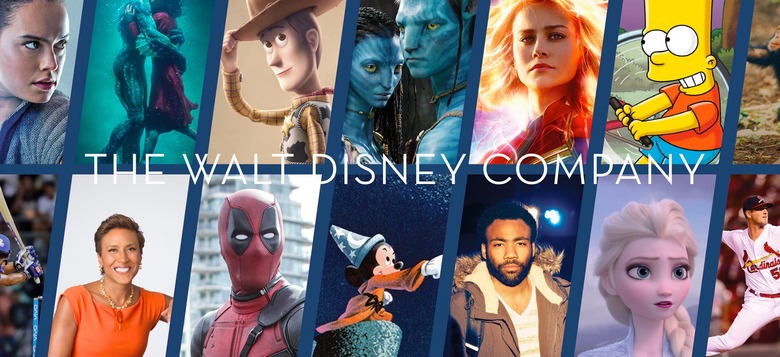Disney's Dominance Is Changing Hollywood, But How Long Can The Studio Stay On Top?
You don't need to be a professional analyst to see that The Walt Disney Company is crushing it in Hollywood these days – and they're not only crushing box office totals, but also other studios and the very norms on which the industry has operated for years. Several reports published in recent days have painted a frank picture of Disney's dominance and how the company's competitors are having to change the way they do business in order to survive. It's Disney's world, and we're just living in it.
But how long will the studio's reign last? Will the very tactics which paved the way for its ascendance ultimately be the cause of its decline?
Disney's Dominance, By The Numbers
It's bleak out there for filmmakers and studios that aren't under the Disney umbrella. Over the past several years, the studio has acquired Pixar, Marvel, Lucasfilm, and Fox to become a seemingly unstoppable behemoth, sucking in consumer dollars like Devastator from Transformers: Revenge of the Fallen. (When's the last time you saw that movie referenced anywhere?) In a recent Buzzfeed report, the outlet says the films Disney has released so far this year have already earned more than $5.61 billion worldwide – and that's only five films. (Last year, the studio pulled in $7.33 billion.) THR puts it in these terms:
[Disney's] domestic market share is more than two and a half times what it was a decade ago, climbing from around 14 percent to more than 35 percent (helped substantially by acquisitions Marvel, Pixar and Lucasfilm, without even including its new purchase, Fox); it's had 11 of the top 20 box office hits in the past five years, per Comscore, and 12 of them crossed the $1 billion mark worldwide.
Simply put, that level of influence allows Disney to make moves other studios can't: everything from staking claim to ideal release dates years in advance and forcing the competition to slink out of the way, to being able to secure the best television advertising deals with networks and cable channels. In most cases, Disney's power moves force other studios to avoid trying to compete directly with the Mouse House, resulting in projects that Disney would never make, like Get Out, The Conjuring films, and projects aimed at more niche audiences instead of the family-friendly four-quadrant projects on which Disney thrives.
That's great in theory – who doesn't want to see more original movies in theaters? – but the problem comes when studios have to find a window to release these them theatrically. Disney has a few holes in its schedule, and it seems as if for other companies are going to have to think outside the box to put their own products into those gaps – even if it doesn't necessarily align with what they've done previously. (Pie in the sky hope: maybe this results in better movies being spread throughout the year instead of being funneled through the final few months?)
Disney still has The Lion King, Frozen 2, and Star Wars: The Rise of Skywalker left on its release calendar this year. Any one of those movies would be the jewel in any other studio's annual crown, but they're all just icing on an ever-growing cake. But will that cake eventually topple over?
Could Disney's Successful Formula Eventually Cause Its Decline?
Disney seems untouchable right now – depressingly so. Don't get me wrong: I actually like most of the films that fall under the Disney umbrella, but it's just unfortunate to think about how any single studio can control such a vast majority of the market share and alter the entire film industry in such a significant way. Will this dominance last forever?
Buzzfeed suggests that the studio's strategy of adapting its animated classics into live-action features could end up backfiring in the long run. New versions of The Little Mermaid and Snow White are already in the works, but the studio has burned through many of its most beloved stories already.
Cruella, a 101 Dalmations prequel starring Emma Stone, may be a good test of what's to come. Can that film generate the same level of interest that Aladdin and Beauty and the Beast did? If so, Disney's probably in great shape for the foreseeable future. If not, they may have some slight concerns ahead. The studio is releasing eight live-action movies over the course of 2021 and 2022. Expensive non-remakes like Tomorrowland and The Lone Ranger crashed and burned at the box office, so if its live-action films start to dip toward those movies in terms of quality, audiences might eventually wise up and realize that not every one of these major "event" films is actually an event after all.
Until then, Disney's movies are consistently rated higher on Rotten Tomatoes than any other studio – on average, they're 15 points higher. That's a huge gap, so maybe some of these industry-wide worries can be alleviated if other studios start making films that audiences actually want to see instead of projects like this summer's blockbuster line-up, which reek of desperation. Of course, that's easy for me to say and not nearly as easy to actually execute. And even though I dig a lot of the stuff Disney releases, I genuinely hope that another studio – hell, hopefully several – carve out a successful plan that lets them thrive in a Disney-controlled world. If they don't, only a single power will reign over the movie landscape, and I'd rather not see a world in which Disney eats up even more of its rivals and leaves tiny indies as the only things struggling to stay afloat in its wake.


